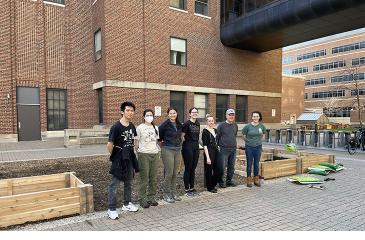The Health Sciences Education Center (HSEC) Interprofessional Student Garden offers students a space for respite, wellness, and organic relationships across disciplines
In 2020, the University of Minnesota health interprofessional wellbeing initiative BeWELL conducted a student survey to gauge interest in initiatives and programming to support the cultivation of community and wellbeing for health sciences students.
When gardening was identified as one of the top three wellbeing activities preferred by students, the Wellbeing Programming Committee took the initial steps on a journey to create the first garden on the east bank of the Twin Cities campus in Minneapolis a reality.
Cindy Irons, executive assistant in the Office of the Associate Vice President for Academic Health Sciences, and Laura Dammer Hess, director for the Center for Health Interprofessional Programs, serve as staff advisors to the garden.
“After researching options and looking for potential places, we identified a potential space near the Mayo and Phillips Wangensteen buildings,” said Irons.
When Irons discovered the plot of land belonged to the Center for Women’s Health Research, she approached the department and in June 2021, the center’s leadership graciously approved use for interprofessional gardening purposes. Irons and BeWELL committee members then worked with Landscape Facilities Management and University Landcare to ensure that all regulations were followed in plans to create the garden.
Brooke Offenhauser, a second-year Community Health Promotion MPH student, and Melanie Quick, a second-year medical student, serve as co-presidents of the Interprofessional Student Garden Advisory Board and lead the committee responsible for planting, maintaining and sustaining the garden in future years.
“My mom grew up on a farm and I’ve always loved gardening,” said Offenhauser. “Gardening feels like a rite of passage to me and during the pandemic especially, gardening offered a meditative space.”
For medical student Quick, gardening was also an activity she grew up with.
“My grandfather was a big gardener, and I grew up spending time with him on raised bed gardening,” said Quick. The interprofessional aspect is also important to Quick. “At gardening events, there are people interacting who otherwise would not meet each other. Our clinical schools can be insular as we are taking classes with others in our program. When you become friends with other students from other schools, you develop mutual respect, and it widens your perspectives.”
Offenhauser and Quick worked with the seven-member Student Garden Advisory Board on initial planning and design in 2022, which included securing lumber, hardware and blocks for raised garden beds.
“The students decided on what they wanted to plant in the first year and decided on herbal plants, some fruit including strawberries and vegetables,” said Irons.
Some plants were started from seeds and the Advisory Board also worked to secure donations of plants and materials.
“Doing something outside of academics and science is so good for your mental health,” said Offenhauser. “Being in nature, watching things grow once planted, and contributing to something meaningful helps reduce stress and build our student community.”
In its inaugural growing season in summer 2022, many of the garden’s vegetables and herbs were offered to students to pick for use once they were ready to harvest.
“A big focus has been on sustainability in terms of funding and organization,” said Quick. “Extra produce was donated to the Care Corner—a ‘take as you need’ food pantry in the Interprofessional Lounge in HSEC, and this is one aspect we’d love to see grow over the years,”
Student leadership in designing, building, planting, and taking care of the garden in its first year has led to a bright future. The garden’s cedar raised beds were constructed to last 10 to 15 years before they need to be replaced.
“One of my favorite things with the garden is the tables in the center of the space with chairs for people to study in a calming green space,” said Offenhauser. “Doing something outside of academics is so good for your mental health. It’s about people coming together to contribute to something meaningful.”
As advisor to the garden, Irons sees the benefits to students firsthand. “It’s so gratifying to work with students on this garden and to see how they’ve gotten other students engaged along the way,” said Irons. “It’s really wonderful to see students laughing, working together and enjoying this activity together, and I hope it continues to grow.”
- Lynette Thompson
- Center for Interprofessional Health
- School of Nursing
- College of Pharmacy (including Pharmacy, Occupational Therapy, and Medical Laboratory Sciences)
- Office of Student and Resident Affairs, School of Dentistry
- Division of Physical Therapy
- School of Public Health



